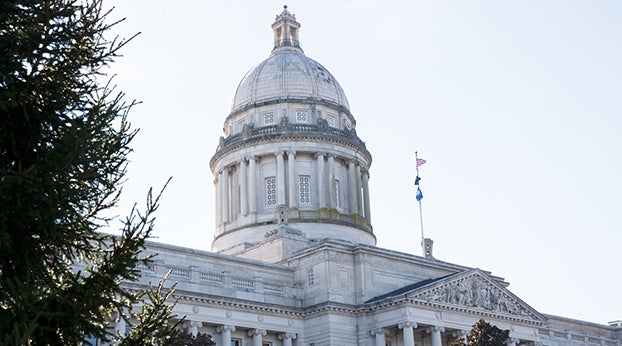State rep. summarizes outcome of 2019 General Assembly
Published 7:35 pm Tuesday, April 2, 2019
By DANIEL ELLIOTT
Guest columnist
FRANKFORT — It was a cold January morning a little more than 18 years ago when state lawmakers arrived in Frankfort to convene the first annual legislative session in the commonwealth’s history.
Kentucky voters had amended the state constitution to allow for annual sessions the previous fall, setting the stage for the 2001 General Assembly to assemble and take up legislation that had lost steam in the prior year’s “budget session,” plus a few new bills.
The 2019 Regular Session which ended on Thursday, March 28, was, in many ways, a perfect example of what annual sessions were designed to be: a chance to fine-tune legislation considered in the last regular session while tackling new issues that had surfaced over the past year.
Broad-based school safety legislation in Senate Bill 1, signed into law on March 11 and already in effect, is a blend of past bills and new information gathered by lawmakers last year statewide to improve school safety compliance and response.
The Work Ready Kentucky Scholarship legislation, now law, resembles but expands on workforce-education legislation that passed the Senate last year, while another bill signed into law this session to allow permitless concealed carry for qualified persons also resembles legislation considered in 2018.
Public pensions were also back on the legislative agenda this session with HB 358, a bill that would give regional state universities, community colleges and “quasi-governmental” agencies like health departments and mental health boards that have been struggling to meet their costs in the Kentucky Employees Retirement System (KERS) a chance to leave the system as of June 30, 2020, by paying their unfunded liability to the system in a lump sum or installments. Postsecondary institutions and quasi agencies that decide to stay in KERS would have to pay the full retirement contribution rate to the system starting in July 2020.
Additionally, HB 358 would allow longtime employees of organizations that choose to leave KERS to stay in their existing KERS plan or move to a defined-contribution plan similar to a 401(k). Newer hires — those hired since 2014 — and new hires would have to enroll in a defined-contribution plan. HB 358 as amended by the House and Senate received final passage in the House on a vote of 58-39.
A continuation of the 2018 General Assembly’s tax reform efforts were also successful this session with passage of HB 354 and HB 268, both now law. HB 354 is this session’s clean-up bill to remove sales tax on charitable admissions, provide some tax exemptions and lower some property tax rates among other changes. It also repeals the state’s bank franchise tax, instead requiring small community banks to pay corporate income tax starting in 2021. The sales tax exemptions for charities and other nonprofits in HB 354 have already taken effect, as required by the legislation.
The second bill, HB 268, amends the current state budget to increase funding in several areas including the state’s economic development bond program, school technology, capital improvements. It also appropriates $2.12 million in General Fund dollars for debt service on approximately $50 million in Kentucky State Park capital improvement projects authorized by the bill.
All but two portions of the bill were signed into law, with those two portions vetoed by the governor. One of those portions — concerning funding for Area Development Districts (ADDs) — was overridden by the General Assembly late Thursday, as was the governor’s veto of all of HB 4, a measure dealing with Kentucky’s legislative administrative regulation review process.
Many more bills had been signed into law or were headed to the governor’s desk for his signature by the close of the session on Thursday. Here’s a short list of major bills that had become law, or were on their way to becoming law, by the time the final gavel fell late Thursday:
• HB 11. HB 11 would ban the use of tobacco, e-cigarettes and vaping devices on public school campuses, in school vehicles and at school activities beginning with the 2020-21 school year. Exceptions could be made in smoking areas designated by a school superintendent or principal, and school employees and volunteers would be allowed to use such products at school-related activities when not in the presence of students. School districts would have up to three years to opt out of the ban should they choose. The legislation received final passage in the Senate by a vote of 28-10 and now goes to the governor for his signature.
• HB 135. HB 135 will prohibit public agencies from requiring labor agreements between labor organizations and contractors on public works projects with few exceptions. The legislation, which passed the House on a 50-44 vote in February, was signed by the governor on March 21.
• HB 158. HB 158 outlines 16 rights for foster children in out-of-home placement in Kentucky including the right to food, clothing and shelter and freedom from abuse. It will also require national and state background checks on those who work in child-caring facilities such as residential homes. The bill was signed into law on March 19, with the background check provisions taking effect immediately.
• SB 50 and other abortion-related bills. SB 50 is one of four abortion-related bills passed this session and signed into law by the governor. SB 50 requires health providers to report prescriptions written for RU-486 or any drug or drugs intended to end pregnancy to the state. It was signed into law on March 26. The three remaining new abortion-related laws from the 2019 annual session include: HB 5, which will make it a felony to perform an abortion based on the unborn child’s gender, race, color, national origin or disability (signed into law on March 19); HB 148, which will outlaw abortion in Kentucky in most cases should the landmark Roe v. Wade ruling be reversed (signed into law on March 26); and SB 9, known as the “fetal heartbeat bill,” which will prohibit abortion once the heartbeat of an unborn child is detected (signed into law on March 15).
A federal judge in Louisville has issued a temporary order barring SB 9 and HB 5 from taking effect after a lawsuit was filed challenging the measures.
• SB 55. SB 55 will create a “Green Alert” system to alert first responders when a military veteran or active duty service member deemed at-risk due to a service-related condition such as post-traumatic stress disorder, or PTSD, has been reported missing. The legislation — which passed the House unanimously on March 12, was signed into law by the governor on March 22.
• SB 97. SB 97 will make it possible for sexual assault victims to track forensic testing of their case online. The legislation passed the House unanimously on March 12 and was signed into law by the governor on March 22.
• SB 100. SB 100 — signed into law on March 26 — will let the Kentucky Public Service Commission set rates for net metering of solar power. Customers with solar panels are now credited the retail rate for excess solar power they generate and feed into the electrical grid. The legislation was given final passage by the House on a 55-36 vote on March 14.
Because of the momentous vote for annual sessions that Kentuckians statewide made nearly two decades ago, our state doesn’t have to wait 21 months or longer between sessions to revisit or act on new important legislation. The fact that our next annual session is a budget session will only improve the chances at passage for many bills—and appropriations bills especially—in 2020.
Although the legislative process has run its course for this annual session, there will still be action taken on bills in the days ahead. Bills that received final passage on Thursday will now go to the governor who can choose to sign the legislation into law, veto it, or allow it to become law without his signature.
You can keep up with all 2019 Regular Session action by logging onto the Legislative Research Commission website at legislature.ky.gov. Please also feel free to use the Legislative Message Line at (800) 372-7181 to voice your opinion.
Daniel Elliott is the state representative for Kentucky’s 54th District, which includes Boyle and Casey counties.






